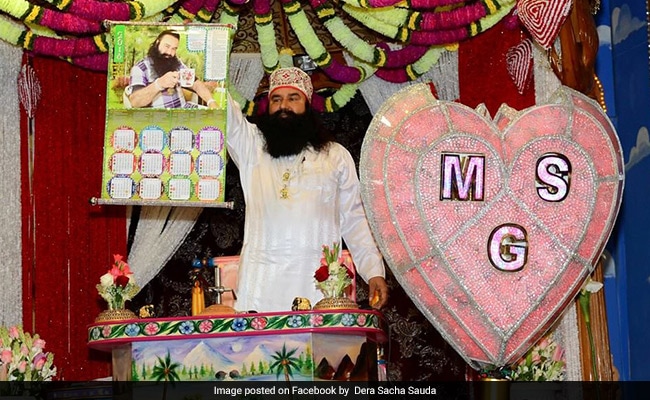One would have thought such outrageous behavior would have opened the eyes of those thronging his Dera to the horrendous goings-on in a place of spiritual retreat. Instead, television viewers all over the country, and, indeed, the world over, have been stunned by the spectacle of these devotees venting their fury at the Baba's conviction and sentence by burning vehicles, damaging public property, viciously attacking security personnel and, in consequence, dying by the score and suffering grievous injury by the hundred. What explains such unflinching loyalty to such an unworthy object of veneration?
The immediate temptation is to draw parallels with Western and Oriental precedents, as Mohan Guruswamy, that walking encyclopaedia, has done in a forthcoming article for The Asian Age and The Deccan Chronicle that he has kindly shared with me and other friends in advance, drawing attention to the mass suicides instigated among their followers when the law threatened to catch up with David Koresh of the Branch Davidians and Jim Jones of the People's Temple, or the Sarin gas attack on Tokyo's metro instigated by Godman Shaji Asahora of the Aum Shinrikyo cult.

Gurmeet Ram Rahim has been sentenced to 20 years in jail for raping 2 followers
To you and me, the Baba might appear bizarre, leaping around miraculously in his multi-coloured costumes, calling to mind the Captain Marvel comics of our childhood - except that this Captain Marvel's rippling muscular arms are encircled with gem-studded amulets and his chest ablaze with golden chains and charms. For his hundreds of thousands of followers, he is God - or a pretty close likeness to Him. His antics attract not derisive laughter but admiration. His creativity is seen not as the perverted imagination of a narcissist but proof of his genius, of his supernatural powers, indeed, of his divine nature.
His devotees are not narrowly concentrated but spread far and wide. In a state where electoral outcomes are often decided by margins of a few thousand, it is estimated that there are at least 50 assembly segments that turn on his nod, his followers in these pockets varying from around 5,000 to as high as 15,000 - enough to make or break political careers. So, political parties flock to him. He, however, has been careful not to publicly reveal his hand - with the solitary exception of 2014 when Modi so eloquently heaped showers of praise on this indicted rapist that the Baba was sufficiently moved to openly declare his support for the BJP. Not only did Modi, in consequence, sweep the state, but his acolyte, the wholly incompetent ML Khattar, owed his becoming Chief Minister entirely to the magnanimous patronage of this predatory Messenger of God - his self-bestowed title, with the acronym MSG emblazoned on his clothing.

Known for his weakness for rhinestone, sequins and bling, Gurmeet Ram Rahim is now prisoner number 1997
As for class, in the minds of the aspiring lower middle class of Haryana and surrounding states, Gurmeet Ram Rahim Singh represents the hope of fulfilling their soaring ambitions. He appears to make the impossible possible, not treating their aspirations "with contempt", as Prof. Shiv Visvanathan of Jindal University underlines in another deeply perceptive article in The Hindu. "The dream of equality," he writes, "can go back to the Bhakti movement or it can summon the French Revolution. But one thing is clear: democracy and modernization have not delivered equality...the pidgin of faith that Singh espouses makes sense, provides a sense of communitas, welcoming the poor and the discarded".
Oddly, especially in the light of what he has been convicted for, his appeal is greatest among women of poor and low caste families because the Dera offers them escape from the humdrum routine of their lives. Caught, for the most part, in the drudgery of homemaking in a highly patriarchal society and confined, for the most part, to the rasoi (kitchen) and the aangan (courtyard), they head in hordes to the Dera not merely, or perhaps even primarily, for spiritual succor, but to escape (albeit temporarily) from the stranglehold of social structures and cultural strictures that govern their everyday lives. Where life in their own homes and habitats amounts to a form of unending servitude, they find freedom in the Dera. Not only does the Dera provide entertainment and a rich shopping experience (the Dera is awash with malls), outings to places near and far are arranged where they get to see other, sometimes exotic, locales in the congenial company of friends and family - free holidays, as it were, that fulfil them as human beings.

Dera Sacha Sauda claims Gurmeet Ram Rahim Singh has 50 million followers
Tragically, the Supreme Court, in one of its most regressive judgements ever, backed the Khattar government. The swarna jati women have thus become the arbiters of the fate of rural (and urban) Haryana simply by getting the far more popular OBC and scheduled caste women debarred from even testing the electoral waters. In effect, this endorses all the oppressive societal and cultural norms that have afflicted the liberation of historically disadvantaged Haryanvis, above all Haryanvi women who were beginning to find dignity and social acceptance through their constitutional role in village governance won at the demanding bar of public opinion. No wonder so many have found haven in Gurmeet Ram Rahim's Dera where their lack of education, caste and class did not result in their being ostracized.
That is what explains the Baba's enormous appeal - notwithstanding charges of rape that have now been confirmed. Several unfortunate women suffered grievously at his hands; lakhs upon lakhs only benefited.
(Mani Shankar Aiyar is former Congress MP, Lok Sabha and Rajya Sabha.)
Disclaimer: The opinions expressed within this article are the personal opinions of the author. The facts and opinions appearing in the article do not reflect the views of NDTV and NDTV does not assume any responsibility or liability for the same.


